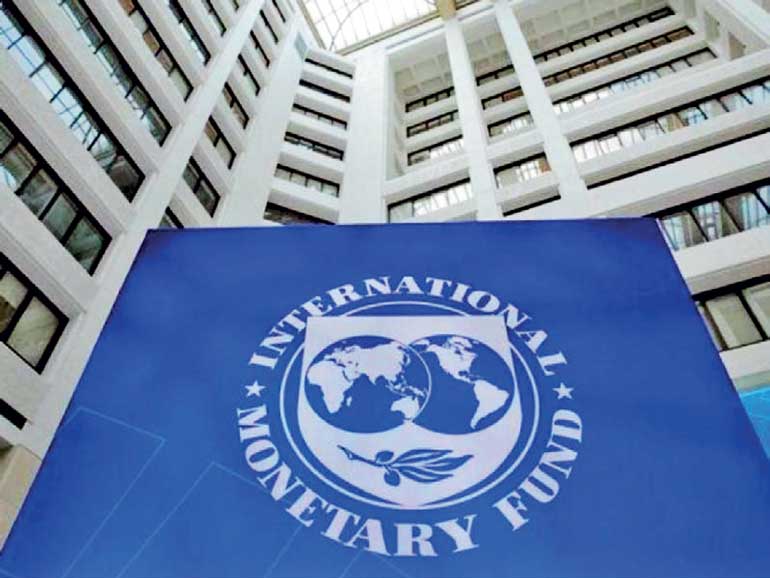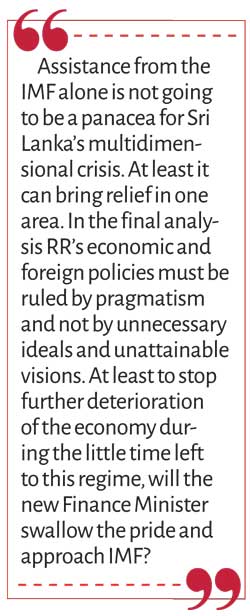Sunday Feb 15, 2026
Sunday Feb 15, 2026
Tuesday, 20 July 2021 00:00 - - {{hitsCtrl.values.hits}}

There are two or three ways of benefiting by seeking help from the IMF. Firstly, it is the cheapest source of credit available in the market, but subject to certain conditions. Secondly, approaching the IMF gives an indication to Western powers that Sri Lanka has re-joined the IMF family and is prepared to play even-handedly at least between the West and China. Thirdly, it may open the doors for more financial and other assistance from countries like India and Japan
 Economic policymakers who are advising the Rajapaksa Regime (RR) seem to be advocating what they call an alternative path to development, without detailing in any document or forum what constitutes that path and how smooth or rough the journey along that path is going to be for the economy and people. If the distance covered so far is any evidence, then there is no doubt that the path is pointing towards a cul-de-sac. Sri Lanka’s economic crisis is multidimensional.
Economic policymakers who are advising the Rajapaksa Regime (RR) seem to be advocating what they call an alternative path to development, without detailing in any document or forum what constitutes that path and how smooth or rough the journey along that path is going to be for the economy and people. If the distance covered so far is any evidence, then there is no doubt that the path is pointing towards a cul-de-sac. Sri Lanka’s economic crisis is multidimensional.
One of the core elements of this alternate way seems to be a negative attitude towards the International Monetary Fund (IMF), and policymakers are stubbornly unwilling to approach that institution for financial assistance.
The IMF and World Bank (WB) were created after World War II specifically to help economies in difficulties due to scarcity of savings and capital. The IMF would assist on short-term basis when countries face chronic deficits in balance of payments (BOP), whereas the WB would assist in financing long-term projects.
Sri Lanka, a member of the IMF and currently facing chronic BOP deficits, qualifies for IMF assistance, if approached. Needless to say, that there are conditions such as tax and spending cuts attached to IMF assistance. Yet, it is the cheapest source of credit available in the market today. There were instances in the past, as at the end of the second JVP insurrection in 1980s and during the civil war in 1990s, when the IMF provided assistance and the economy avoided bankruptcy.
It is no secret that the IMF is ideologically committed to promote free market capitalism, and any interference in the operation of free market and free movement of capital is anathema to that institution. It is therefore labelled by many as an institution that operates in the interest of big capital and rich nations. There is of course a lot of truth in this. But given the situation that Sri Lanka find itself today, can beggars be too choosy?
Looking at the current situation pragmatically, IMF assistance would open the doors for RR not only to ease the financial pressure but also repair the damage the regime has caused in the area of foreign policy. For a long-time Sri Lanka was committed to the idea of non-alignment. That is the most sensible policy for a small island nation like Sri Lanka situated along the shores of a crucially important waterway, the Indian Ocean.
It was only during the period of Rajapaksa presidencies (2005-2015 and 2019 onwards) that the policy of non-alignment was allowed to erode, and at a time when a new cold war is brewing between the US and its allies on the one hand, which includes India and Japan, and China on the other, in which the Indian Ocean in particular is poised to become a main theatre of confrontation that Sri Lanka has veered too close towards China, and to the discomfort of India, Japan and the West.
This tilt in foreign policy has obviously angered the West, which has begun exerting pressure on RR on totally different grounds. For example, the hard-hitting resolution resulting from the United Nations Human Rights Commissioner’s Report on Sri Lanka, which was passed in Geneva in September last year, and the most recently announced threat of withdrawing or suspending GSP Plus concessions to Sri Lankan exports entering into European Union (EU), unless the Sri Lankan Government seriously reforms or removes altogether its draconian Prevention of Terrorism Act (POTA) are actions that have foreign policy underpinnings.
Had RR for example, not withdrawn from the US Millennium Challenge Corporation Negotiations, or refused to offer India and Japan, apparently under instigation of China, the contract for developing and operating the Colombo Harbour East Container Terminal, or for that matter, kept its “predator friend” China at equidistance as between Sri Lanka and the West, it is doubtful whether UNHCR resolution would have been passed or EU would have issued the said threat.
Historically, the US and the West are notorious for trampling human rights in so many developing countries to protect the interests of imperialism and Western hegemony. Likewise, terrorism and counter terrorism are highly undefined terminologies popularised by US after S11 that gave a free hand to governments in power to arrest, torture, incarcerate and even kill their political opponents by condemning them as terrorists.
For instance, as Roberts meticulously researched and argued, it was as part of George Bush’s diplomatic manoeuvre to win China’s support at the UN for US Global War on Terror (GWOT) and subsequently for US invasion of Afghanistan and Iraq that he conceded China’s request to include in the UN list of terror groups, the Eastern Turkistan Islamic Movement (ETIM), which, as China alleged, to have supported the Uyghur demand for a Xinjiang Uygur Autonomous Region.
It was this US sacrifice of Uyghurs in the interest of US inspired GWOT that ultimately led to the current tragedy of “cultural genocide” of Uyghurs unleashed by Xi Jinping’s Communist China (Sean R. Roberts, ‘The War on The Uyghurs,’ Princeton and Oxford: Princeton University Press, 2020). Now Joe Biden is shedding crocodile tears for Uyghur sufferings. Thus, the West’s tears for human rights in Sri Lanka and elsewhere, and EU’s concerns about POTA are covers to get RR to change its foreign policy. What has this got to do with IMF financial assistance?
There are two or three ways of benefiting by seeking help from the IMF. Firstly, and as pointed out earlier, it is the cheapest source of credit available in the market, but subject to certain conditions.
Secondly, approaching the IMF gives an indication to Western powers that Sri Lanka has re-joined the IMF family and is prepared to play even-handedly at least between the West and China. This does not mean that Sri Lanka has to cut off its friendship with China. It calls for a diplomatic game of delicately balancing the country’s own interests with competing powers and their conflicting demands, which requires professional expertise that unfortunately seems to be in short supply within RR.
Thirdly, it may open the doors for more financial and other assistance from countries like India and Japan. If RR gets closer to India for example, Prime Minister Modi’s insistence on implementing the controversial 13th Amendment may remain just rhetoric and to the disappointment of Tamils.
However, assistance from the IMF alone is not going to be a panacea for Sri Lanka’s multidimensional crisis. At least it can bring relief in one area. In the final analysis RR’s economic and foreign policies must be ruled by pragmatism and not by unnecessary ideals and unattainable visions. At least to stop further deterioration of the economy during the little time left to this regime, will the new Finance Minister swallow the pride and approach IMF?
(The writer is attached to the School of Business & Governance, Murdoch University, Western Australia.)